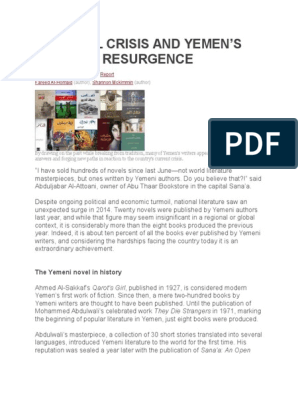0% found this document useful (0 votes)
207 views8 pagesمقدمة لأبرز الكتاب والروائيين العرب
The document discusses prominent Arab novelists and their notable works. It profiles several novelists including Ahlem Mosteghanemi from Algeria known for her Memory of the Flesh trilogy, Waciny Laredj from Algeria known for unique narrative styles across novels, Ahmed Khaled Tawfiq from Egypt known as the 'Godfather' of Arab horror and science fiction, and Radwa Ashour from Egypt known for historical fiction novels translated internationally.
Uploaded by
Khalil AbdulhameedCopyright
© © All Rights Reserved
We take content rights seriously. If you suspect this is your content, claim it here.
Available Formats
Download as DOCX, PDF, TXT or read online on Scribd
0% found this document useful (0 votes)
207 views8 pagesمقدمة لأبرز الكتاب والروائيين العرب
The document discusses prominent Arab novelists and their notable works. It profiles several novelists including Ahlem Mosteghanemi from Algeria known for her Memory of the Flesh trilogy, Waciny Laredj from Algeria known for unique narrative styles across novels, Ahmed Khaled Tawfiq from Egypt known as the 'Godfather' of Arab horror and science fiction, and Radwa Ashour from Egypt known for historical fiction novels translated internationally.
Uploaded by
Khalil AbdulhameedCopyright
© © All Rights Reserved
We take content rights seriously. If you suspect this is your content, claim it here.
Available Formats
Download as DOCX, PDF, TXT or read online on Scribd
/ 8







































































































